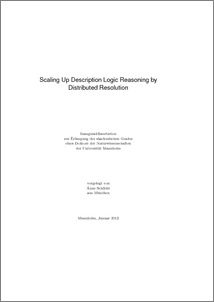|
Scaling Up Description Logic Reasoning by Distributed Resolution
Schlicht, Anne
![[img]](https://madoc.bib.uni-mannheim.de/style/images/fileicons/application_pdf.png)  Vorschau |
|
PDF (Dissertation )
dissertation_schlicht.pdf
- Veröffentlichte Version
Download (1MB)
|
|
URL:
|
https://ub-madoc.bib.uni-mannheim.de/31365
|
|
URN:
|
urn:nbn:de:bsz:180-madoc-313655
|
|
Dokumenttyp:
|
Dissertation
|
|
Erscheinungsjahr:
|
2012
|
|
Ort der Veröffentlichung:
|
Mannheim
|
|
Verlag:
|
Universität Mannheim
|
|
Hochschule:
|
Universität Mannheim
|
|
Gutachter:
|
Stuckenschmidt, Heiner
|
|
Datum der mündl. Prüfung:
|
29 März 2012
|
|
Sprache der Veröffentlichung:
|
Englisch
|
|
Einrichtung:
|
Fakultät für Wirtschaftsinformatik und Wirtschaftsmathematik > Practical Computer Science II: Artificial Intelligence (Stuckenschmidt 2009-)
|
|
Fachgebiet:
|
004 Informatik
|
|
Normierte Schlagwörter (SWD):
|
Automatisches Beweisverfahren , Paralleler Algorithmus , Wissensverarbeitung
|
|
Freie Schlagwörter (Englisch):
|
Theorem Proving , Parallel Computation , Knowledge Management
|
|
Abstract:
|
Benefits from structured knowledge representation have motivated the creation of large description logic ontologies. For accessing implicit information and avoiding errors in ontologies, reasoning services are necessary. However, the available reasoning methods suffer from scalability problems as the size of ontologies keeps growing.
This thesis investigates a distributed reasoning method that improves scalability by splitting a reasoning process into a set of largely independent subprocesses. In contrast to most description logic reasoners, the proposed approach is based on resolution calculi. We prove that the method is sound and complete for first order logic and different description logic subsets. Evaluation of the implementation shows a heavy decrease of runtime compared to reasoning on a single machine. Hence, the increased computation power pays off the overhead caused by distribution. Dependencies between subprocesses can be kept low enough to allow efficient distribution.
Furthermore, we investigate and compare different algorithms for computing the distribution of axioms and provide an optimization of the distributed reasoning method that improves workload balance in a dynamic setting.
|
|
Übersetzung des Abstracts:
|
Der Zugang zu gespeichertem Wissen wird durch den Einsatz formaler Sprachen
erheblich erleichtert. Besonders in Medizin und Biologie wird Fachwissen
in Form von großen Ontologien dargestellt, um Forschung und Entwicklung
zu unterstützen. Mit Methoden der Wissensrepräsentation ist es
möglich, Anfragen zu komplexen Zusammenhängen automatisch zu beantworten.
Allerdings stoßen bestehende Methoden bei der Bearbeitung von
Anfragen schnell an die Grenzen der verfügbaren Ressourcen, wenn die verwendete
Ontologie komplex und umfangreich ist.
Die vorliegende Arbeit stellt einen Ansatz zur Lösung des Problems
vor, der die Skalierbarkeit durch Parallelisierung der Berechnung verbessert.
Durch die Aufteilung auf mehrere Prozesse wird die Rechenzeit erheblich reduziert.
Die Grundidee besteht darin, die Berechnung so aufzuteilen, dass
zwischen den Teilprozessen wenig Abhängigkeiten bestehen und der Kommunikationsaufwand
gering ist.
Das vorgeschlagene Verfahren ist auf Basis eines existierenden Prädikatenlogik
Beweisers implementiert, und die Effizienz des Ansatzes wurde
experimentell nachgewiesen. Zusätzlich wurden verschiedene Strategien zur
Verteilung untersucht und deren Auswirkungen auf die Effizienz des Verfahrens.
Des Weiteren wurde die Methode so generalisiert, dass die Verteilung
zur Laufzeit auf eine veränderliche Anzahl Rechner angepasst werden kann.
(Deutsch)
|
 | Dieser Eintrag ist Teil der Universitätsbibliographie. |
 | Das Dokument wird vom Publikationsserver der Universitätsbibliothek Mannheim bereitgestellt. |
 Suche Autoren in Suche Autoren in
Sie haben einen Fehler gefunden? Teilen Sie uns Ihren Korrekturwunsch bitte hier mit: E-Mail
Actions (login required)
 |
Eintrag anzeigen |
|
|
